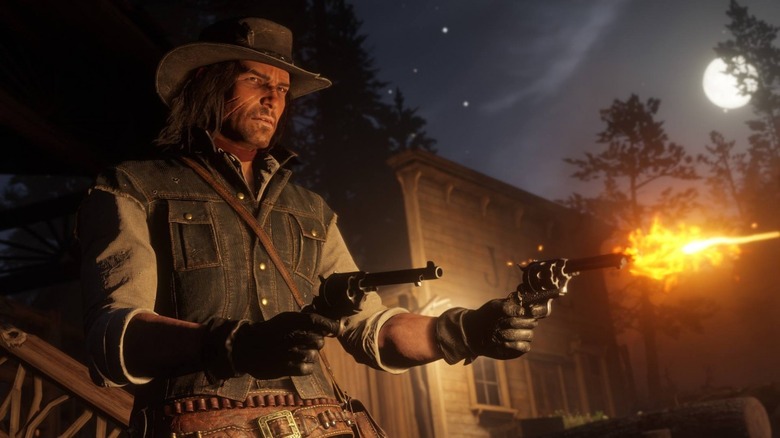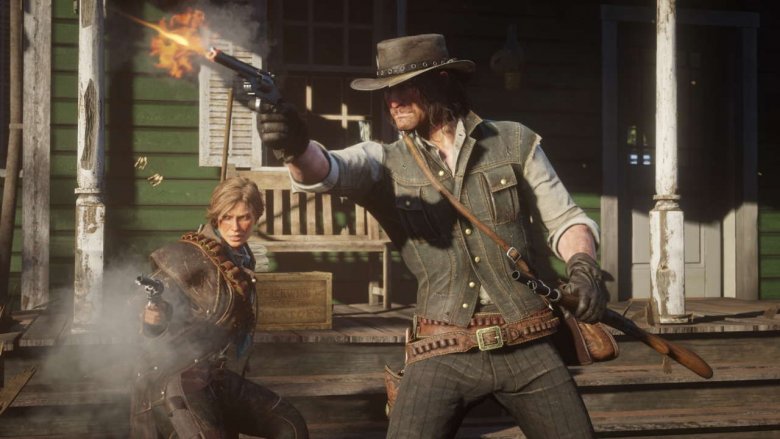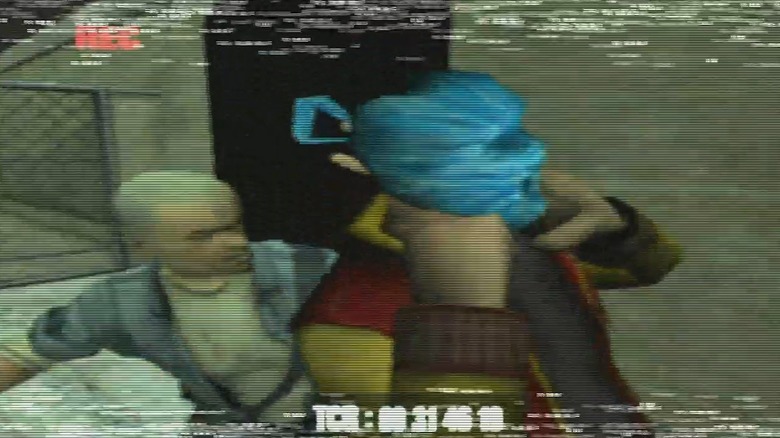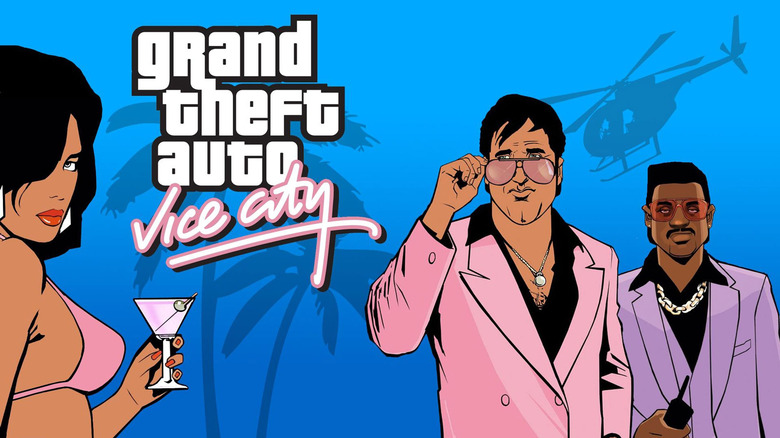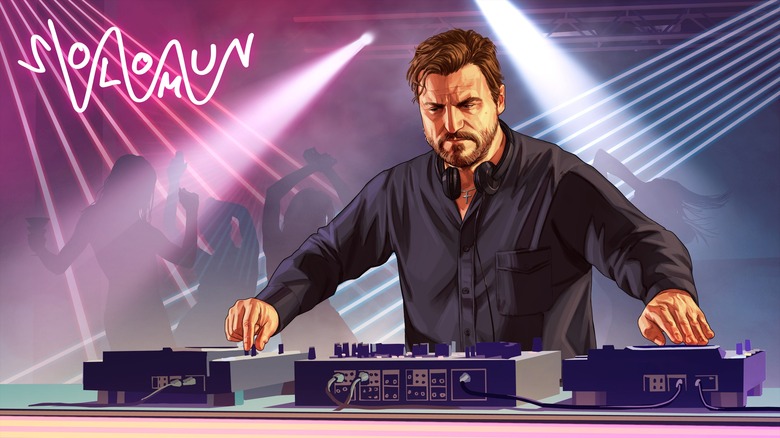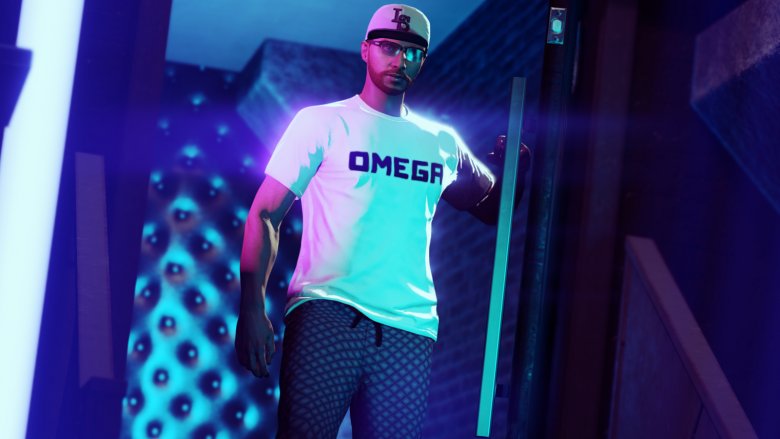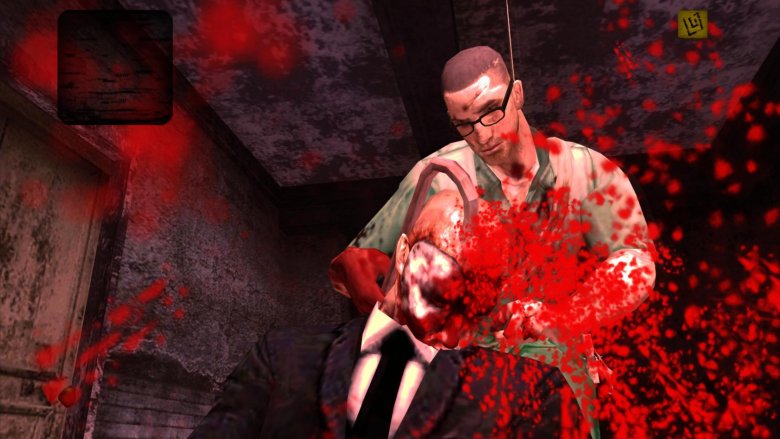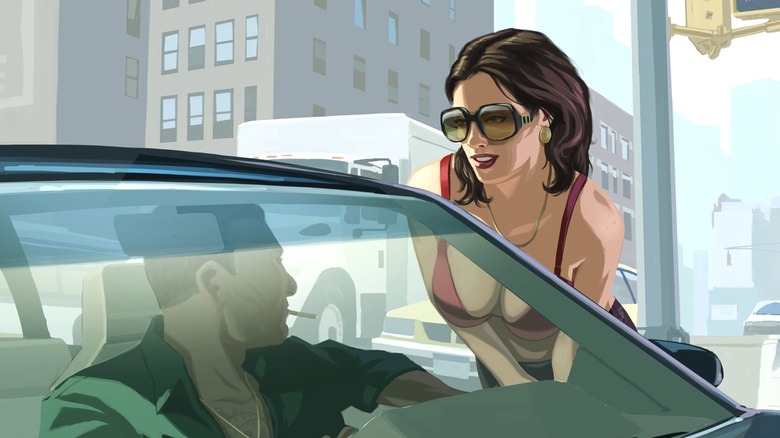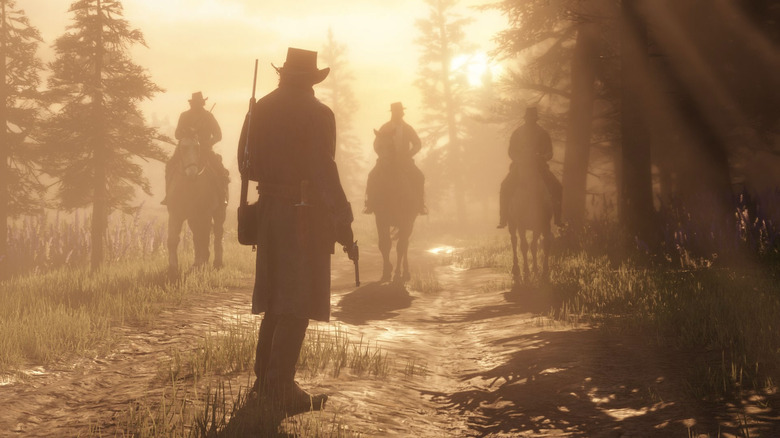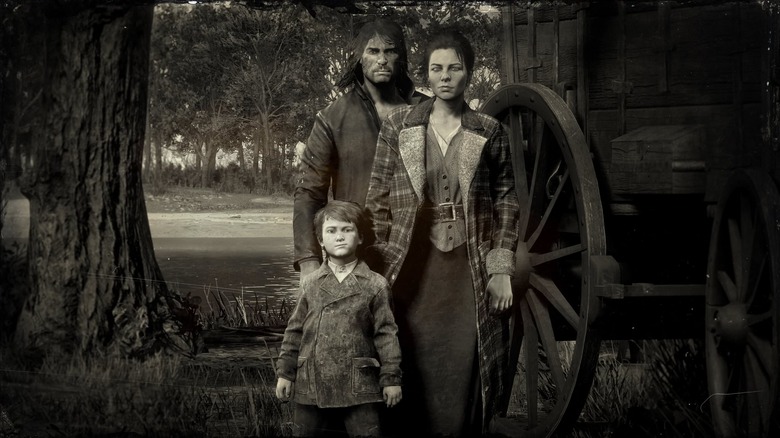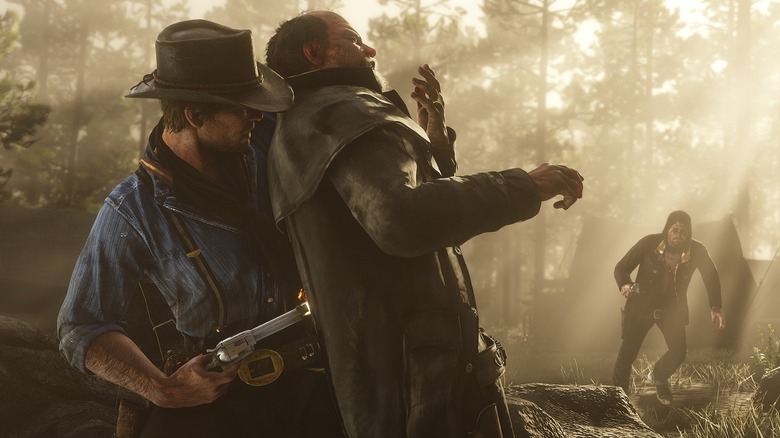Shady Things Rockstar Wants You To Forget About
Rockstar Games is aptly named, because there's no brighter star in game development. Some of the best games in existence are Rockstar games, from the Grand Theft Auto series to Red Dead making Westerns cool again: these games consistently garner awards galore and the attention of the whole world. All these accolades are for good reason: the games Rockstar makes are sprawling, interactive, and interwoven with stories that surprise and tantalize.
This isn't to say that Rockstar can do no wrong. Quite the contrary: on the way to the top, the studio has stepped with steel-toed cowboy boots on a number of toes. Rockstar's callous characters with little regard for the rules might be inspired by internal politics that have led to serious allegations over the years. Arthur Morgan and Trevor Phillips might have the spotlight, but behind the scenes and in the shadows, Rockstar has done some seriously shady things.
Rockstar has the largest gender pay gap of any UK studio
It's no secret that video games have a sexism issue. For an industry where the player base is evenly split between the genders, there's not nearly the same representation within studios. According to the International Game Developers Association, approximately 23% of game developers identify as female. This number is naturally on the rise as studios recognize toxic work cultures that make it hard for women to work in game development (cough, cough, Riot). What also makes for more women working at game studios is equal pay, which is not the case at Rockstar.
The UK averages an 18.4% disparity between male and female hourly wages, which is bad, but not as dismal as Rockstar's UK branch Rockstar North. The 2018 gender pay gap report on the studio revealed that female staff is paid 64% less on average than male staff. A more stark comparison is that of the highest salaries at the studio, only 8% of those big wigs are women. It's not a pretty picture, but since the report's publishing, the company has declared a dedication toward closing this gap and pledged "to continue to find new ways to support and encourage women to both take up and advance in career opportunities in game development."
Here's to hoping that dedication doesn't waver.
Manhunt and real life violence
For the millionth time: video games have no correlation to violent behavior. Shooting at cops in GTA 5 won't encourage kids to do so in real life, but a previous Rockstar title had parents and policy makers wondering if playing the blood-soaked survival-horror game Manhunt had prompted a player to carry out an actual murder.
In 2004, parents of a 14-year-old murder victim implicated the game because their son's murderer had been a fan. The 17-year-old had allegedly been "obsessed" with Manhunt at the time he cornered Stefan Pakeerah with a hammer. The controversy led the largest retailer in the UK to pull the game from their shelves and the grisliness of the snuff-film-turned game to come under the scrutiny of the public eye. Rockstar offered their condolences to the family and denied any responsibility for "encouraging violence." After all, the principal character is trapped, forced to kill by a madman; he is not taking any pleasure from what he does. On top of that, the game is rated PEGI 18, meaning that a 17-year-old shouldn't have been playing the game in the first place.
Despite this, the game and by extension Rockstar, was at the center of a reignited debate as to the role of video games had in violent behavior.
"Kill all the Haitians!" - Rockstar
Grand Theft Auto: Vice City is, naturally, full of vice. The game has the player building their very own empire constructed with bricks of cocaine and cemented by the blood of their enemies. But this crime-ridden plot isn't what people have taken issue with. New York City Mayor Michael R. Bloomberg spoke out against the game when outrage around a prompt in the game to "Kill all the Haitians!" became Rockstar's controversy of the week.
For context, the prompt appears when the protagonist is hired by a Cuban gang to take out their enemies, the Haitians, who appear locked, loaded, and shooting. However, the game was released at a time when there had been several police shootings of Haitian-American citizens, and after the offending language had been reported on, politicians had been pressured to make a statement, who in turn demanded Rockstar to answer for the ill-timed, seriously un-PC language.
To their credit, Rockstar did apologize and say they would remove the objectionable statement but went on to say that video games are an adult medium, and therefore will have adult content, not unlike traditional media.
Grand Theft mixtape
Cruising, rolling over pedestrians, outrunning the cops after a successful heist: it would all be a little lackluster without music blaring out of your stolen vehicle's stereo. In GTA 5 there are 17 stations and 162 new songs to drive around and steal cars to. Two of those songs are also allegedly stolen.
Rapper Daz Dillinger says that Rockstar approached him with the offer of $4,271 for his two tracks "C-Walk" and "Nothin' But the Cavi Hit," both of which are on the West Coast Classics station in the game. He was insulted by the low offer and turned the studio down, so then was surprised to find the songs in the game. In light of this, Dillinger demanded that Rockstar either give him less of a lowball offer or destroy every unsold copy of GTA 5 in a cease-and-desist letter.
Obviously the latter didn't happen. Rockstar's response to these demands and lawyers and accusations? Radio silence.
Benzies v Houser
At one time, Rockstar was headed up by the Houser brothers and Leslie Benzies. The studio abruptly became a family affair when Benzies was allegedly ousted by Sam and Dan. Benzies was offered a six-month, paid sabbatical after the release of GTA 5; after all, he had worked hard on getting GTA Online up and running. This, he said, was a trap. His company email was locked, the Blackberry given to him by Rockstar remotely deactivated, and he was removed from the premises when he tried to go into one of the studio's offices.
Rockstar claimed Benzies no longer worked there after "significant performance and conduct issues." Benzies claimed that he was cheated out of millions of dollars in royalties and that Sam Houser "orchestrated and encouraged a company culture involving strip clubs, personal photography of employees in sexually compromising positions, and other conduct grossly in violation of standard workplace norms."
The two had apparently had a tense relationship in the days after GTA 5's release, but Benzies said he had trusted Houser until the locks had been changed on the studio doors. As controversial as the suit against Rockstar is, it doesn't appear to be the strongest. The New York Supreme Court has said that there was no language in the contracts Benzies had signed that suggested he was due an equal share of royalties, which is what he is alleging.
No word yet on the "company culture involving strip clubs."
No one felt right working on Manhunt
How much work goes into rigging and animating a murder scene? Probably a lot more time than it takes for players to spill the blood and move onto their next victim in Manhunt. Apparently the game had been a "pet project" of Rockstar North's and the team working there were feeling the effects of staring at gore and guts for eight (or more, much more) hours a day.
In 2007, one ex-team member wrote on his blog about what it had been like making Manhunt into reality. Jeff Williams said that he didn't support the release of the game. "It was all about the violence, and it was realistic violence. We all knew there was no way we could explain away that game. There was no way to rationalize it. We were crossing a line," he said.
The game got caught up in the hackneyed "violence in video games" debate, receiving the honor of the first video game banned in New Zealand. The Chicago Tribune called Manhunt the "most violent video game of all time" and that may be the reason why Williams said that developing the game made him feel "icky."
Violence toward women? Misogyny? Don't like it, don't buy it.
The lack of playable female characters in Rockstar games has become more and more conspicuous as time goes on. This gap in representation is juxtaposed by the highly criticized ability to brutalize women, namely sex workers, in the games. Of course, GTA titles encourages violence toward everyone — men, women, and machinery if you're bad enough at driving — but there seems to be a nasty subsection of players that take advantage of the most vulnerable women in the game.
The signers of a petition on change.org that maxed out with 48,341 signatures focused on this violence players that could perpetrate toward women in GTA 5. The petition implored retailers to pull the game considering that "games like this are grooming yet another generation of boys to tolerate violence against women." Target and K-Mart in Australia subsequently removed the game from their shelves.
CEO and chairman of Rockstar's parent company Take-Two Karl Slatoff said that this was an infringement on free speech. In an often criticized quote, he stated, "If you don't like it and it's offensive to you, then you don't buy it." This has been called a lazy write-off of responsibility, especially in the face of the fact that other than player-created avatars in GTA 5, there hasn't been a female protagonist in a Rockstar game this century.
Some developers will never get credited
We can only imagine the satisfaction and pride developers feel when at last they can watch the world play the final product of their blood, sweat, and tears. Especially when it is a game like Red Dead Redemption 2, which released to rave reviews. The game had been in development for eight years, which a lot of time to work at Rockstar, a company whose policies around crunch are allegedly demanding, draining, and nearly impossible. Not everyone who started working on RDR2 in 2010 was still with the company eight years later.
In that case, even if you worked on the game for years, no matter how sizable your contribution, your name is not credited in the end scroll. Developers who aren't present start-to-finish leave no credited mark on the game.
Jennifer Kolbe, Rockstar's head of publishing, said in an interview with Kotaku, "That has been a consistent policy because we have always felt that we want the team to get to the finish line. And so a very long time ago, we decided that if you didn't actually finish the game, then you wouldn't be in the credits."
After uproar about crunch time, the studio issued a public "thank you" letter on the Rockstar site, listing every name of every single person who had worked on RDR2. It's not featured in each copy of the game, but it's certainly a step up from utter exclusion.
Rockstar is a lifestyle, not a job
In 2010, an open letter to Rockstar from "wives of Rockstar San Diego employees" called out the company for harsh working conditions, impossible hours, and a reckless disregard for the feelings of their employees, many of whom had been "diagnosed with symptoms of depression." This was during the development of the first Red Dead Redemption title, which, according to the blog post on Gamasutra, required 12-hour work days, six days a week on top of benefits being cut.
This painted a bleak image of an over-demanding management. Rockstar has been recorded many times over, namely in interviews, stressing that working for Rockstar is more of a lifestyle than a job. Former employees have said that having a family or a life outside the company was viewed as a hindrance. When this accusation came to light, the International Game Developers Association gave their opinion on the concept of crunch, saying they found the "practice of undisclosed and constant overtime to be deceptive, exploitative, and ultimately harmful not only to developers but to their final product and the industry as a whole."
Rockstar's response to the situation was that they were saddened, that no company was perfect, that the accusations added up to a few anonymous postings, and that fans had nothing to worry about. Overall, Rockstar brushed off the outrage, but this wasn't the first and certainly not the last time that their work practices would draw the ire of the industry.
Rockstar and the crunch controversy
When Rockstar co-founder Dan Houser proudly told New York Magazine that the studio had been working on Red Dead Redemption 2 for 100-hour work weeks, he was met with outrage. For perspective, that number suggests 14-hour work days, seven days a week. Since that statement, employees were freed from the studio's strict policies regarding social media, allowing them to share their stories and perspectives. Experiences naturally vary, but the culture of crunch at Rockstar seems unchanged since the original controversy in 2010.
Extra nights and weekends were apparently voluntary, but expected, enforced with guilt and red marks on timesheets. What's disturbing is that for salaried employees, these hours were effectively unpaid; they just had to hope that the bonus at the end of the year would be worth the toll on their health and personal life. According to some insider interviews with Kotaku, crunch lasted months, even years. Despite the demanding hours, employees spoke to enjoying their jobs, and thus feeling unable to refuse 80-hour work weeks. Across the board, no matter the department, it appeared as if everyone was working near-double the usual standard. And they were afraid to talk about it, fearful of internal or external backlash.
Houser later clarified that he meant that he had been working the long hours on the senior writing team, but it had already been documented that many Rockstar offices had resorted to catering dinners during the week and offering laundry services — after all, employees wouldn't have time outside the office to do their own errands.

